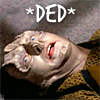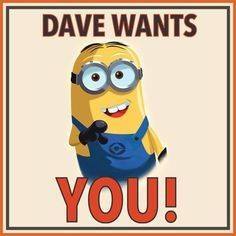Firefighter here. I was reflecting on a fatality I attended recently. My thoughts wandered to how a body looks like it is ‘just matter’ in a way that a living thing does not, even when sleeping. Previously I assumed this observation was just something to do with traumatic death, but this person seemed to have died peacefully and the same, ‘absence’ of something was obvious.
I’m not a religious person, but it made me wonder if there actually is something that ‘leaves’ when someone dies (beyond the obvious breathing, pulse etc).
I’m not looking for a ‘my holy book says’, kind of discussion here, but rather a reflection on the direct, lived experiences of people who see death regularly.
It’s just a living body makes so many minute movements we don’t usually notice.
Lungs Expanding and contracting, flow of blood (yeah you can notice that), texture of the skin, muscle position, etc.
We have evolved to quickly differentiate between a living body and dead body. That’s why the uncanny valley exists.
We have evolved to quickly differentiate between a living body and dead body. That’s why the uncanny valley exists.
Interesting. Any thoughts on what evolutionary advantage there is for being able to sense whether someone is alive or not?
I seem to recall that animals can sense whether other animals are dead (or rotten/contaminated)?
Imagine coming upon a lot of delicious-looking mushrooms, a couple of which are in the hands and mouth of a dead person. Being faster to realize the person is dead, and to flee, than the time it takes to take and eat the mushrooms, is why you’ll live to reproduce. Same for the dead animals around that fresh-looking water hole.
Thank you for ELI5!
I don’t think there’s any great mystery to this. We want to breed with the mate most likely to help us produce viable offspring. Therefore we’re sensitive to indications of health and good genes. Symmetry, smoothness of muscle movements, quality of skin & hair, indications of good blood flow, even things like regular breathing are all indications. When we see a simulation that appears not quite human it’s noticable for all those details. That detection of unhealthy can easily detect death of course. There may also have been an instinct to avoid the sick, but social pressures override that sometimes.
The internet theory that we wanted to detect imposter humans is silly. Early hominids interbred a lot. It’s not “human” that we’re sensitive too. Just health.
I seem to recall that animals can sense whether other animals are dead (or rotten/contaminated)?
They smell putrefaction.
It starts immediately when life has ended. It doesn’t wait for days, or hours, out of decency or so…
TIL the word “purification”. Thank you!
Edit: putrification (damn autocorrect, and it’s still underlined in red).
Edit: putrefaction (sigh)
I admire your tenacity.
That’s where “putrid,” mostly used ime to describe a rotten smell, but also applicable to the morals of your least favorite politician, comes from
I love this question! I’ve seen it asked a few different ways. “What evolutionary benefit did the recoil reaction to the ‘uncanny valley’ provide?”. Thinking about the answer is kinda scary.
I’d think one benefit of being able to quickly discern between the living and the dead would be increased survival chances during death events. If you can see that someone is dead, less likely to face a dangerous predator, natural disaster, or contagion, or at least stop investing precious time in those situations if they found themselves in them.
I think it’s mostly for things like rabies or other contagious diseases that make people act differently. That’s mostly because frankly, I don’t get nearly as much of a reaction to an unanimated but lifelike robot/mannequin/sex doll/CGI screenshot as I do to a moving one, and I wouldn’t describe my reaction to a dead body as uncanny valley at all. That said, it was a loved one’s body and I watched them die peacefully, so that could reduce any unnerving aspects.
I’ve heard the uncanny valley affect also being attributed to ancient ancestors encountering other early non-human-but similar competitors. The effect of, “Oh look, another Neanderthal- Wait, shit, not like me, abort abort!”. I don’t know how likely that is, but it’s an interesting thought.
Early hominids interbred. Modern humans are a result of that mixing.
I’m not an expert on this at all, but my understanding is that “evolutionary advantage” is a misconception. Mutations don’t have a goal, and they don’t always provide an advantage. Hopefully someone smarter than me can explain better.
Edit: spelling
Evolution throws spaghetti at the wall and anything that sticks it keeps. Usually stuff sticks because it’s useful in some way, but some stuff sticks just because of random chance.
For example if a few individuals colonize a new location, then whatever genes those founders have will be prevalent in the new population. The classic example is the deaf people on Martha’s Vineyard. Some of the original settlers of the island were deaf and passed that down to their descendants.
The smaller a population is the more it’s affected by random genetic drift. (It’s easier for a gene to randomly spread to an entire population if the population is small.) The larger it is the more it’s affected by natural selection.
I have to admit I have wondered if it is the blue skin.
There’s a tension and maybe responsiveness to skin and muscles that is uncanny when missing. Not sure many here could 100% recognize that very early on at the point of death, but at some point there is a wariness/unnatural look to the skin. Between that and our assumed ability to pick up on a complete lack of movement/breathing/pallor makes it reasonably certain that there is a “something” we recognize as missing, even if it’s hard to describe perfectly.
This is exactly what the uncanny valley is. A corpse is so close to resembling a living human without being a living human that it freaks our brains out.
and for good reason. we probably should - even in the modern day - be wary when finding a dead body.
This is why I find tv corpses too “pretty”. Dead people have this slackness to the face that actors pretending to be dead can’t or won’t emulate. The closest to a dead person’s face among the living is a drunk sleeper.
I’ve hospiced plenty of folks right until they’ve passed and that feeling of missing comes sooner than clinical death, I’ll tell you. Once someone’s respiration rate drops low enough and their pulse and BP are undetectable, and the blood starts pooling, you’ll have a very hard time differentiating them from a body without a stethoscope and time. Clinically dead folks do tend to become a job to deal with and aren’t something that register as people, though you still feel the need to be respectful.
There is a lot that is missing, your body has to do a lot just function. We get so used to seeing these things that when you don’t it looks just wrong. It’s the same issue that is showing up when companies try to make robots with human faces, they are not doing the normal things a person’s body does and this looks just wrong to us like something is missing. That is why it’s better to make robots that don’t look too close to humans so it don’t look so weird.
That is why it’s better to make robots that don’t look too close to humans so it doesn’t look so weird.
https://en.wikipedia.org/wiki/Uncanny_valley
Yup, if the robot looks nothing like a real human or it resembles a human perfectly, then everything feels fine. But, in between is where it feels weird.
Medic 30+ years.
Life “energy” is gone. Of course no one knows what happens to the electrical energy in a human upon death… but, it definitely leaves the body.
This is where people’s belief system kicks in. I’m not religious and don’t believe in heaven/hell. I do personally believe in a spirit world.
I kind of like the most remote possiblity of becoming a ghost.
Of course no one knows what happens to the electrical energy in a human upon death… but, it definitely leaves the body.
Of course we know.
Cells create electric potential by pumping different kind of ions in or out of the cell. That requires ATP which is produced during metabolism. If you’re dead your cells stop producing ATP and everything, including the ion pumps, stop working. So no more electricity.
It doesn’t “leave” the body. The body simple stops generating it.
Sure. It stops working. I get that. As I mentioned, I believe, maybe… just maybe human energy might continue as a spirit/ghost. Definitely not saying it’s true.
Everyone is entitled to their belief. I also kinda like the idea of maybe being a ghost one day and while I don’t necessarily believe in ghosts I also don’t believe that they don’t exist either. I want to haunt an amusement park.
Just don’t mess with the rollercoaster restraints trying to make a new ghost friend.
I mean, even in a big capacitor or battery the charge leaves eventually
We are more of a generator than a battery.
Well, when the motor stops…
I’ve been in enough futile codes that I hope there isn’t any consciousness beyond the “lights out” point. Especially since most of the codes I participated in were in a pediatric hospital. It doesn’t matter that the brain shut off more than half an hour ago…you just have to keep doing compressions and pantomiming the code until the parents consent to calling it. I’ve seen it get dragged out an extra 45 minutes past where the physician would have called it because the mom didn’t want T.O.D. called until after the dad got to the hospital from work. It’s better with adults, but not by much. There’s only been a handful of times where caving in the sternum was actually worth the destruction involved.
You “personally believe in a spirit world” - that is exactly heaven/hell - religion is belief in a spiritual world…
Semantics -
They didn’t say “spiritual,” they said “spirit” and “ghost.” Ghosts are not in any heaven or hell but unseen among us on Earth. Not necessarily something to worship or fear either. I think it’s a step apart from religion.
Absolutely not of any religious realm. And I would never claim it’s true.
Eh, I don’t think it’s fair to erase all nuance between spirituality and religion.
Heaven/Hell are these ordered places where some sentient divine being is supposed to judge you at death and sort you into. Whether it’s Anubis or God or whatever. It places a sort of human sense of control over the natural world.
Thinking there might be some sort of spiritual something or other, at least on my end, is thinking that well, we’ve got energy in our bodies that dissipates as we die. That energy ends up recycled in some way, first law of thermodynamics and all that. I don’t know if that energy can linger around as ghosts, or act as some new “soul” in some reincarnation cycle, or if it just gets dispersed or what, but you don’t need to believe in religion to consider it.
Though there’s definitely some overlap.
Religion is a set of organized, ritualized practices based on spiritual belief. You can be spiritual without being religious, and I know a bunch of active, practicing Catholics who don’t believe in anything supernatural, so I would say you can be religious without being spiritual.
You might be interested in the story of Luigi Galvani’s experiments with frog muscle tissue. It was seminal work in anatomy as well as physics.
https://www.sciencedirect.com/science/article/pii/S1631069106000370?via%3Dihub
Ty. Far more verbose than an explanation of the frog experiments.
Not responding to your post specifically but I’m just making you aware that there are people who practice spirituality and believe in the soul and there being more out there without being religious
Slip one of those special positive ion bracelets on em and it comes back!
Sorry… Let me know if I should delete this.
Don’t mean to hurt anyone.
deleted by creator
Mortician here.
Deceased people actually do get “lighter”. Immediately after death they loose 50-200 Gramm within seconds, mostly the air they had breath in and is slowly exhaled. After that they start to get lighter due to loss of fluids. I don’t want to go into too much detail but it is not just vaporated water. Depending on position at death and temperature that can be around 10-200 Gramm per hour. That is for the trained eye quite visible as it mostly happens in the outer layers of the body. This also is the reason why deceased men often look unshaved, their hair doesn’t grow, their skin just shrinks.
Most times it is very obvious if the person is dead. But I have also had some uncanny valley experiences where I thought “is she/he maybe just asleep?” In one case a doctor called me to an old woman where two police officers and the doctor claimed her to be dead. I arrived, we grabbed her to lift her up and suddenly she jumps up and scolds us for waking her up.
That was the first time when I had tea and cookies with a customer. She lived for another four years and died at age 101. I felt quite strange visiting the same person twice in my job.
Besides that, you get used to it. Keep it professional, slightly distant, developed a routine. The routine can and should include keeping respect at all time but not necessarily emotions. My Grandpa was pretty good at that, he could even shed a tear without actually feeling something. It helped the bereaved to open for their own emotions.
There was a movie about the loss of weight on death I think. I’ll have to watch it.
If you can remember the name of the movie let me know.
Is it a documentary or a entertainment movie?
Either way, I can honestly say I want to see it for educational reasons.
It was called 21 grams.
Here you go: https://en.wikipedia.org/wiki/21_Grams
It’s hard to explain, but dead looks different from alive. I’ve seen alive people not breathing, and with their heart stopped, and even shot and bleeding out, but dead is something else.










